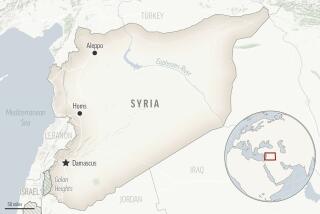Iraq attacks kill at least 46 a week before Arab League summit
- Share via
Reporting from Beirut — A series of explosions and shootings struck Iraq on Tuesday, leaving scores dead and injured a week before a major Arab summit in Baghdad aimed at showcasing the nation’s stability after the U.S. military withdrawal.
Starting shortly after dawn, at least 20 bombs exploded at 13 sites, from Baghdad to the northern city of Kirkuk to the southern cities of Hillah and Karbala. The nationwide death toll was at least 46, with more than 200 injured, the Associated Press reported.
At least two car bombs exploded near the heavily fortified Green Zone, where next week’s Arab League summit is scheduled to take place.
The targets of the attacks included Shiite Muslim pilgrims, Iraqi police, an army patrol, government officials and guards outside a Christian church in Baghdad.
The audacious strikes exposed the vulnerability of Iraq’s massive security apparatus and highlighted the seemingly intractable political and sectarian violence that continues to consume the nation after the U.S. withdrawal in December.
The violence across a vast geographical area also pointed to the organizing capability of Iraqi militants, who for years have honed their skills in coordinated attacks meant to undermine authority and terrorize the population.
On Tuesday, authorities pointed their fingers at the usual culprits: Sunni Arab militants, possibly linked to Al Qaeda, who are waging a war against the Shiite-led government that assumed power after the 2003 U.S.-led invasion ousted Saddam Hussein, a secular Sunni.
To what extent Sunni religious factions are working in tandem with secular nationalist elements opposed to the Shiite-led government remains unclear. Sunni insurgents attacked the U.S. military for years, proving a lethal and skillful foe with expertise in car bombs and roadside explosives.
The Sunni minority dominated the Shiite majority until Hussein’s fall. Many Sunnis have rejected Shiite leadership that they view as subservient to neighboring Iran, a mostly Shiite nation.
This week is the ninth anniversary of the U.S. invasion. Whether the occasion figured into the attackers’ plans was unclear.
Conventional wisdom in Baghdad seemed to indicate that the attacks were timed to precede the Arab League summit. Plans for a similar meeting last year were put off, in part because of security concerns.
The government of Prime Minister Nouri Maliki has ballyhooed the summit as a showcase for a stable and democratic Iraq. Security has been heightened, with checkpoints slowing traffic to a crawl throughout Baghdad. Police were on high alert. But the precautions didn’t foil the attackers.
The first incident appears to have occurred about 6:30 a.m., when gunmen on a motorcycle opened fire outside a church in Baghdad, killing two guards and injuring three.
A little while later, a car bomb struck near the Ministry of Foreign Affairs in Baghdad, killing five people and wounding 24, authorities said.
The deadliest single incident may have involved a car bomb that went off at 7:30 a.m. outside a cafe near the center of Hillah, a predominantly Shiite town, authorities said. The explosion, close to the central prison and a pediatric hospital, left at least 13 dead and 43 injured, police said.
“I was shocked by an explosion near a crowd of people in rush hour,” said a witness, grocery shop owner Ahmed Murshidi, speaking by phone. “It was very sad to see some women among the injured people with their black abayas [traditional robes] covered in blood. Pieces of flesh were scattered here and there.”
Half an hour later, twin bombs struck a bus terminal in Karbala, an important destination for Shiite pilgrims from across the world, killing 12, among them pilgrims from Iran, and injuring more than 40, authorities said.
Other attacks included bombings of government targets in the western cities of Fallouja and Ramadi, a police station in Kirkuk, and a police patrol in Latifiya, south of Baghdad.
Parliament Speaker Usama Nujaifi denounced the attacks as “heinous criminal incidents” meant to “foil the Arab summit in Baghdad, and to keep Iraq under violence and destruction.”
Violence in Iraq is actually way down since the bloody days of 2006-07, when Sunni and Shiite groups fought each other and attacked U.S. troops. But there have been several large attacks since the U.S. pullout, including dozens of explosions Feb. 23 that killed at least 55 people and wounded more than 200, the Associated Press reported.
Iraqi officials declared a holiday next week and were planning to bolster security and close roads for the Arab League summit, scheduled for March 27 to 29. It is to be the first such session in Baghdad in more than 20 years.
A special correspondent in Baghdad contributed to this report.
More to Read
Sign up for Essential California
The most important California stories and recommendations in your inbox every morning.
You may occasionally receive promotional content from the Los Angeles Times.













